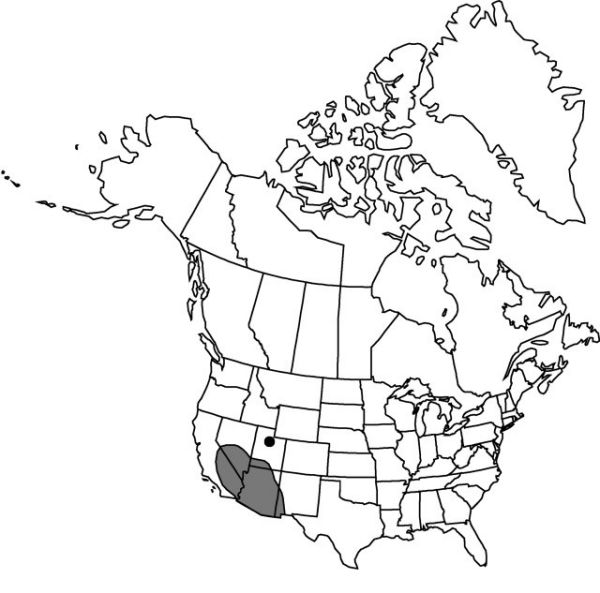Difference between revisions of "Dichelostemma capitatum subsp. pauciflorum"
Four Seasons 9(2): 30. 1992.
Basionym: Brodiaea capitata var. pauciflora Torrey in W. H. Emory, Rep. U. S. Mex. Bound. 2(1): 218. 1859
Synonyms: Brodiaea pulchella var. pauciflora (Torrey) C. V. Morton Dichelostemma pauciflorum (Torrey) Standley Dichelostemma pulchellum var. pauciflorum (Torrey) Hoover Dipterostemon pauciflorus (Torrey) Rydberg Hookera pauciflora (Torrey) Tidestrom Milla capitata var. pauciflora (Torrey) Baker
Treatment appears in FNA Volume 26. Mentioned on page 330.
FNA>Volume Importer |
FNA>Volume Importer |
||
| Line 10: | Line 10: | ||
|name=Brodiaea capitata var. pauciflora | |name=Brodiaea capitata var. pauciflora | ||
|authority=Torrey | |authority=Torrey | ||
| + | |rank=variety | ||
|publication_title=in W. H. Emory, Rep. U. S. Mex. Bound. | |publication_title=in W. H. Emory, Rep. U. S. Mex. Bound. | ||
|publication_place=2(1): 218. 1859 | |publication_place=2(1): 218. 1859 | ||
| Line 16: | Line 17: | ||
|name=Brodiaea pulchella var. pauciflora | |name=Brodiaea pulchella var. pauciflora | ||
|authority=(Torrey) C. V. Morton | |authority=(Torrey) C. V. Morton | ||
| + | |rank=variety | ||
}} {{Treatment/ID/Synonym | }} {{Treatment/ID/Synonym | ||
|name=Dichelostemma pauciflorum | |name=Dichelostemma pauciflorum | ||
|authority=(Torrey) Standley | |authority=(Torrey) Standley | ||
| + | |rank=species | ||
}} {{Treatment/ID/Synonym | }} {{Treatment/ID/Synonym | ||
|name=Dichelostemma pulchellum var. pauciflorum | |name=Dichelostemma pulchellum var. pauciflorum | ||
|authority=(Torrey) Hoover | |authority=(Torrey) Hoover | ||
| + | |rank=variety | ||
}} {{Treatment/ID/Synonym | }} {{Treatment/ID/Synonym | ||
|name=Dipterostemon pauciflorus | |name=Dipterostemon pauciflorus | ||
|authority=(Torrey) Rydberg | |authority=(Torrey) Rydberg | ||
| + | |rank=species | ||
}} {{Treatment/ID/Synonym | }} {{Treatment/ID/Synonym | ||
|name=Hookera pauciflora | |name=Hookera pauciflora | ||
|authority=(Torrey) Tidestrom | |authority=(Torrey) Tidestrom | ||
| + | |rank=species | ||
}} {{Treatment/ID/Synonym | }} {{Treatment/ID/Synonym | ||
|name=Milla capitata var. pauciflora | |name=Milla capitata var. pauciflora | ||
|authority=(Torrey) Baker | |authority=(Torrey) Baker | ||
| + | |rank=variety | ||
}} | }} | ||
|hierarchy=Liliaceae;Dichelostemma;Dichelostemma capitatum;Dichelostemma capitatum subsp. pauciflorum | |hierarchy=Liliaceae;Dichelostemma;Dichelostemma capitatum;Dichelostemma capitatum subsp. pauciflorum | ||
| Line 46: | Line 53: | ||
|elevation=300–2100 m | |elevation=300–2100 m | ||
|distribution=Ariz.;Calif.;Nev.;N.Mex.;Utah;n Mexico (Sonora). | |distribution=Ariz.;Calif.;Nev.;N.Mex.;Utah;n Mexico (Sonora). | ||
| − | |discussion=<p>The characterisics listed for < | + | |discussion=<p>The characterisics listed for <i></i>subsp.<i> pauciflorum</i> may be found to some degree also in <i></i>subsp.<i> capitatum</i>, intergrading especially along distributional boundaries. However, the adaptation of <i></i>subsp.<i> pauciflorum</i> to a desert-type environment usually distinguishes it from most populations of <i></i>subsp.<i> capitatum</i>, which typically is found in more mesic habitats. Since the two taxa are not clearly distinct, G. Keator (1991) concluded that subspecific status is appropriate for them.</p> |
|tables= | |tables= | ||
|references= | |references= | ||
| Line 55: | Line 62: | ||
-->{{#Taxon: | -->{{#Taxon: | ||
name=Dichelostemma capitatum subsp. pauciflorum | name=Dichelostemma capitatum subsp. pauciflorum | ||
| − | |||
|authority=(Torrey) Keator | |authority=(Torrey) Keator | ||
|rank=subspecies | |rank=subspecies | ||
| Line 70: | Line 76: | ||
|publication year=1992 | |publication year=1992 | ||
|special status= | |special status= | ||
| − | |source xml=https://jpend@bitbucket.org/aafc-mbb/fna-data-curation.git/src/ | + | |source xml=https://jpend@bitbucket.org/aafc-mbb/fna-data-curation.git/src/f50eec43f223ca0e34566be0b046453a0960e173/coarse_grained_fna_xml/V26/V26_667.xml |
|genus=Dichelostemma | |genus=Dichelostemma | ||
|species=Dichelostemma capitatum | |species=Dichelostemma capitatum | ||
Revision as of 20:51, 16 December 2019
Inflorescences 2–5-flowered; bracts whitish or streaked purple. Flowers: perianth lobes widely spreading; pedicel 6–35 mm, longer than bracts. 2n = 18, 36, 54.
Phenology: Flowering time highly variable with elevation.
Habitat: Deserts, xeric grasslands, open scrub
Elevation: 300–2100 m
Distribution

Ariz., Calif., Nev., N.Mex., Utah, n Mexico (Sonora).
Discussion
The characterisics listed for subsp. pauciflorum may be found to some degree also in subsp. capitatum, intergrading especially along distributional boundaries. However, the adaptation of subsp. pauciflorum to a desert-type environment usually distinguishes it from most populations of subsp. capitatum, which typically is found in more mesic habitats. Since the two taxa are not clearly distinct, G. Keator (1991) concluded that subspecific status is appropriate for them.
Selected References
None.
Lower Taxa
None.